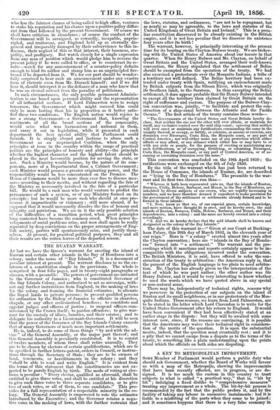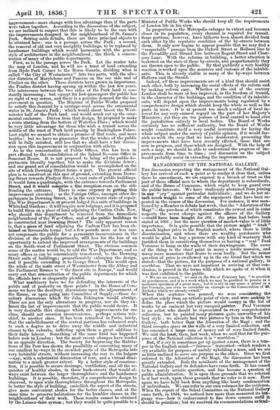A KEY TO METROPOLITAN IMPROVEMENT.
SOME Member of Parliament would perform a public duty who should ask Government, whether the Board of Works will favour us with a map of the Metropolis, showing the improvements that have been recently effected, are in _progress, or are de- signed. It is too much the custom in this country to treat subjects in what is called "a practical way," that is, "bit by bit " ; indulging a fixed dislike to "comprehensive measures" treating any improvement as a whole. The bit-by-bit process is recommended by the fact that the public prefers it, and by the facility of taking any labour in successive instalments: but it is liable to a misfitting of the parts when they come to be joined; and it sometimes happens that there is a very false economy in
improvement—more change with less advantage than if the parts were taken together. According to the discussions of the subject, we are inclined to suspect that this is likely to be the ease with the improvements designed in the neighbourhood of St. James's Park. Setting aside details, there are three principal objects to be attained here : one is a passage across the Park ; a second, the removal of old and very unsightly buildings, to be replaced by handsomer buildings which would harmonize with the general style of architecture in the neighbourhood ; the third, a concen- tration of many of the public departments.
First, as to the passage across the Park. Let the reader take the map of London, and he will see a tract of land extending from Hyde Park Corner to the Horse Guards, dividing what is called "the City of Westminster" into two parts, with the ulte- rior districts of Marylebone and Pancras on the one side and of Pimlico on the other. These districts have grown in importance, the Pimlico district having sprung up within the last few years. The intercourse between the two sides of the Park land is con- stantly increasing ; but except for foot-passengers the public has no right of way across, and there is a genuine demand for the im- provement in question. The Minister of Public Works proposed to satisfy this demand by a carriage-road across the ornamental water in St. James's Park ; which would about bisect the West- minster half of the Park land, and would much cut up the orna- mental enclosure. Driven from that design, he proposed to make e route starting from the bottom of Waterloo Place ; which would be very little advantage for those who wish a transit across the middle of the tract of Park land passing by Buckingham Palace. Last night we seemed to obtain a promise of that route, and more besides ; but we have no guarantee that the wishes of the public will be fully satisfied, sell less that we shall have a fair discus- sion upon this improvement in conjunction with others. As to the concentration of Public Offices, this has been in part effected by the consolidation of the Inland Revenue Office in Somerset House. It is not proposed to bring all the public de- partments literally together, but to make the divisions fewer ; and one grand act of consolidation would be accomplished on the site of which Downing Street forms a part. The present official plan is to construct on this spot of ground, extending from Down- ing Street towards Fludyer Street, a vast suite of public buildings. It would form a quadrangle, with the entrance towards Parliament Street, and it would comprise a flue reception-room on the side fronting the entrance. There is some urgency in getting this improvement executed; as the Foreign Office, amongst other de- partments in Downing Street, is in the very worst state of repair. The War Department is at present lodged in a suite of buildings in Whitehall Gardens ; it will require new lodgings, and it is proposed to build them on a piece of land adjoining the Carlton Club. Now, why should this department be removed from the immediate neighbourhood of the War-Office, and of the public buildings to be constructed near Downing Street ? The only apparent reason is, that a piece of land adjoining the Carlton Club has been ob- tained on favourable terms : but a few pounds more or less can- not compensate the public for a permanent inconvenienee in the division of the public departments, still less for the loss of an opportunity to extend the improved arrangements of the buildings on the South-west of Parliament Street. The obvious common sense of the matter would be, to add the War Department, and as many offices as can be conveniently transferred, to the Downing Street suite of buildings; proportionately enlarging the design, and if possible extending it to George Street. This would open the whole of the main street of Westminster from the Abbey and the Parliament Holises to "the finest site in Europe," and would carry out that concentration of the public departments for which the officials have so eloquently pleaded. What machinery have we for defending the interests of the public and of posterity on these points ? In the House of Com- mons we have the desultory discussions upon the adjournment of the House, or upon going into Committee of Supply,—those de- sultory discussions which Sir John Pakington would. abridge. These are not the only alterations in progress, nor do they ex- haust the list of improvements that the public would desire. It Is -very desirable that changes which are improvements for one class, should not occasion inconvenience, perhaps serious mis- chief, to another class. It has been remarked in Paris, lately, that the embellishment of the central portions has enhanced rents to such a degree as to drive away the middle and industrial classes to the suburbs, inflicting upon them a great addition to their daily labour. Something of the same kind has happened before now in London ; but the most recent changes have tended in an opposite direction. The Society for Improving the Habita- tions of the Poor has shown the possibility of converting many of our smallest by-ways in the crowded parts of the Metropolis into very habitable streets, without increasing the cost to the lodgers —nay, with a substantial diminution of rent, and a virtual dimi- nution to a much greater extent. By a better style of construc- tion, it is possible to secure.drainage, ventilation, and all the re- quisites of healthy abodes, in those back-streets that would al- ways exist between the larger thoroughfares and the handsomer buildings. It is possible, therefore, if a comprehensive design be Observed, to open wide thoroughfares throughout the Metropolis, to better the style of building, embellish the aspect of the streets, give more convenient abodes for the better classes, and at the same time to preserve habitations for the humbler classes in the neighbourhood- of their work. These results cannot be obtained by the Laissez-faire system; but they would be quite possible to a
Minister of Public Works who should keep all the requirements of London life in his view.
In proportion as the Metropolis enlarges in extent and becomes closer in its population, every channel is required for transit. Some portions, however, have hitherto been almost divided from each other by the repulsive condition of the by-streets between them. It only now begins to appear possible that we may find a " respectable " passage from the Oxford Street or Holborn line to the Piccadilly and Strand line between Regent Street and Chan- cery Lane. With the reforms in building, a better attention is bestowed on the state of these by-streets, and proportionately they are thrown open to the public. By that publicity a very healthy reaction is worked upon the manners and customs of the inhabit- ants. This is already visible in many of the by-ways between Holborn and the Strand.
Indeed, all these improvements are of a kind that should assist each other, both by increasing the social effects of the reform and by making reform easy. Whether at the end of the century London shall be more or less improved, in the freedom of transit, in the character of the buildings, and the condition of its inhabit- ants, will depend upon the improvements being regulated by a comprehensive design which should keep the whole as well as the parts in view. It is at present too much a subject of local in- terest for any very earnest regard on the part of her Majesty's Ministers • yet they are too jealous of local control to hand over the jurisdiction entirely to local bodies. The Board of Works certainly has no sufficient authority, but the Board of Works might constitute itself a very useful instrument for laying the whole subject under the survey of public opinion if it would fur- nish us with the map that we have desiderated, presenting the improvements that have been recently effected, those that are now in progress, and those which are designed. With the help of such a map, we should be able to understand the progress of im- provements from time to time ; and discussion on the subject would probably assist in extending the improvements.



























 Previous page
Previous page